
Engagement Indo-Pazifik
Partner für den Frieden: Pistorius am Asia-Pacific Center for Security Studies
Erster Abschnitt des ArtikelsPistorius spricht am Asia-Pacific Center for Security Studies
Nachfolgend finden Sie die Rede von Verteidigungsminister Boris Pistorius, die er am 31. Juli 2024 während seiner militärpolitischen Reise in die Indo-Pazifik-Region am Daniel K. Inouye Asia-Pacific Center for Security Studies in Honolulu gehalten hat. In seiner Rede zum Thema „From Europe to the Pacific: Enhancing Security through Partnership” betont Pistorius, wie wichtig die Zusammenarbeit mit Partnern für Frieden und Sicherheit ist. Es gilt das gesprochene Wort
Dr. Lori Forman,
Ladies and Gentlemen,
Thank you for this kind introduction.
I am very pleased to speak at the Daniel K. Inouye Asia-Pacific Center for Security Studies. This center embodies a very special and important vision: one of a free and prosperous Indo-Pacific. A vision which could not be more relevant today.
By providing a platform for open discussion and by addressing pressing security issues the center has enabled security cooperation among nations that are diverse in culture, history and interests.
Its collaborative approach has led to a shared commitment to regional stability and has fostered mutual understanding, trust, and cooperation.
It is this same spirit that Senator Inouye, one of the founding fathers of the center, embodied. I was very impressed to learn about his personal story and his belief in the power of dialogue and cooperation.
Yesterday, when I visited the USS Arizona Memorial, I was deeply moved. I tried to imagine how Inouye, as a second-generation Japanese American, must have experienced the attack on Pearl Harbor on December 7th of 1941. How tormented he must have been to see Japanese airplanes piercing through the skies above Hawaii, attacking American ships and facilities.
And yet, after the war he chose the path of reconciliation. He reached out to the former aggressor Japan and dedicated his work to strengthening the bonds across the Pacific. Bonds established between former enemies that would pave the way to shared peace and prosperity after World War II. Both in the Indo-Pacific and in Europe.
For me, his legacy shows not only the triumph of reconciliation over conflict. It shows above all, the triumph of cooperation and order over division and violence. His legacy also serves as a reminder that isolationism and nationalism never lead to peace and prosperity, but to conflict and decline.
Ladies and Gentlemen,
I have come to this region to promote closer cooperation, to strengthen existing bonds and to establish new ones. I have come in the firm conviction that the challenges and crises of the world are interconnected. Today more than ever before. We cannot separate the security challenges of the Indo-Pacific from those in Europe. And if we want to address the strategic issues of our time successfully, we need strong partnerships.
And to me, one partnership naturally comes to mind. A partnership of historic importance to our two countries. And a partnership of personal importance to me, a child of the Cold War.
In my hometown I grew up among soldiers that were once enemies – and later defended Germany’s security. A partnership that was – like the US-Japanese relations after World War II – built on reconciliation and the conviction that cooperation benefits all sides: the transatlantic bond.
Today, we are proud of this decades-long partnership that is characterized by trust, shared values, and the clear understanding that peace and freedom must be defended and is worth defending.
This unique partnership and its multilateral institutions have enabled our security, our peace, our stability and our prosperity over the past 75 years.
It is worth remembering just how valuable NATONorth Atlantic Treaty Organization was and still is: NATONorth Atlantic Treaty Organization is not only one of the longest-lasting defensive alliances in history. It is also one of the most robust international organizations committed to freedom and sovereignty of its member states. Together we are standing strong across the Atlantic against aggressors and threats to this commitment.
Today, in the face of Putin’s brutal war of aggression against a sovereign nation in the heart of Europe and a dramatic military build-up in Russia, NATONorth Atlantic Treaty Organization is stronger and more united than ever. It has welcomed new members and intensified its partnerships.
Together, we have shown the world and all revisionist and imperialist powers that we stand together in defending stability, peace and our international order.
Germany has fully understood that Europe must step up its game in terms of security. A stronger European pillar in NATONorth Atlantic Treaty Organization reduces the burden for the US and is also in our own interest. Together with our European allies, we are working hard towards this goal. Let me point out three aspects that underline our commitment.
Firstly, we are reinforcing collective defense, NATONorth Atlantic Treaty Organization’s core task. Germany plays a central role in protecting NATONorth Atlantic Treaty Organization’s eastern flank. We have increased our presence in the air, on land, and at sea in the eastern part of Europe.
With the Multinational Corps Northeast, the German-Netherlands Corps and a newly created maritime command for the Baltic Sea, we are assuming leadership responsibility on the eastern flank – either as a joint effort or on a rotational basis with other Allies.
In Lithuania, we are leading the enhanced Forward Presence Battle Group with almost 800 deployed soldiers. At the same time, we are preparing the permanent deployment of a full combat-ready brigade in Lithuania. All this is accompanied by an extensive exercise schedule on the eastern flank.
Secondly, we are spending more – and we are spending more together:
This year, two thirds of NATONorth Atlantic Treaty Organization Allies will fulfill the pledge of at least 2 percent of GDP on defense. Germany is among them: We are spending 150 per cent more on defense than a decade ago. This year, Germany will spend more on defense than ever before in the history of the Bundeswehr.
But we cannot and we must not stop there. We need to move beyond the 2 percent goal. And we need to do it quickly against the backdrop of Russia’s aggression. This is a clear call – also on my own government.
In recent years, we have launched significant new investments in military equipment. With the 100 billion Euro special fund, that the German Chancellor launched after Russia’s full-scale invasion of Ukraine, we are closing critical capability gaps, for example with our recent purchase of 35 F-35 fighter jets and new PatriotPhased Array Tracking Radar to Intercept on Target air defense systems.
Just a few weeks ago, the Budget Committee of the German Parliament approved further projects that will continue to enhance our capabilities. We are procuring more than 100 additional Leopard 2A8 tanks, two state-of-the-art frigates, additional PATRIOT air defense systems and many other equipment items. And we are working hard on expanding our industrial capacities in order to make more capabilities available. At the same time, we are buying additional defense equipment, arms and ammunition in Europe as well as in the U.S.
With U.S. defense companies alone, we currently have around 380 contracts signed, amounting to a total of around 23 billion US Dollars. I am convinced: In order to be successful, we need to further improve the coordination and pooling of our demands. We must procure and use more standardized and interoperable weapon systems to close capability gaps. This will significantly deepen and widen collaboration with our partners.
Thirdly, we contribute more: Germany has practically gone “all in” – with troops, capabilities, and command and control assets. We are, for example, providing 35,000 personnel at the two highest readiness levels to the NATONorth Atlantic Treaty Organization Force Model.
Furthermore, we are demonstrating our commitment to crisis management and prevention through substantial contributions to NATONorth Atlantic Treaty Organization, EUEuropäische Union and UNUnited Nations missions and operations.
Ukraine is – of course – the most urgent topic regarding European security.
Germany is the largest provider of military assistance in Europe and the second largest in the world after the United States. Overall, the EUEuropäische Union and its member states account for roughly two thirds of the overall assistance for Kyiv.
This also makes very clear: Only together and in concert will we be able to fend off autocratic aggression. And I am grateful that many nations of the Indo-Pacific are supporting this common cause by supporting Ukraine – politically, with unprecedented sanctions against Russia or even by delivering much needed goods to the war-ravaged country.
Ultimately, this war is about much more than Russia and Ukraine. Much more than the transatlantic alliance defending the brave people of Ukraine. This war is about the question of whether we will allow an imperialist power to invade another sovereign state and annex territories in violation of international law.
Other states around the world who oppose democracy and freedom are looking very carefully at what is happening in Ukraine, including here, in the Indo-Pacific. And those who cherish democracy must support Ukraine’s fight for freedom. That is why I am extremely grateful for America’s leadership and commitment to Ukraine.
Together, we will prove that Russia cannot wait us out. That we are steadfast and strong, and that our support will not falter.
Ladies and Gentlemen,
We Europeans know very well that America's attention and resources are increasingly moving towards the Indo-Pacific. Let me assure you: We share your understanding of the enormous challenges we face in this region. The Indo-Pacific matters not only to your security, but also to ours.
Germany is well aware of the long-term challenge that an increasingly assertive China poses to the stability and peace in the Western Pacific. In the Indo-Pacific, Chinese ambitions and capabilities have been growing. This is posing a threat to the existing order in the region. We see how many countries of the Indo-Pacific look towards China with growing concern. And I want to be clear in this context on an important matter: Any unilateral change to the status quo in the Taiwan Strait is unacceptable, all the more so if such a change were to involve the use of coercive or military means.
Here again we see an ever-closer connection between the challenges in Europe and those in the Indo-pacific: There is rising concern over Beijing’s military build-up and the way it is shaping its “limitless friendship” with Russia, a ruthless aggressor, that Beijing supports by delivering dual-use equipment that will prolong the war and bloodshed in Ukraine.
The close ties between Russia and North Korea, but also between Russia and China, go far beyond political and economic cooperation.
The recent summit meeting of Kim Jong-Un and Vladimir Putin did not only demonstrate their ambition to challenge the existing international order by promoting authoritarianism against democratic systems around the world. It also has significant implications for regional and global security. North Korea’s advancements in missile technology and nuclear capabilities, combined with Russia’s vast military resources, present a potential threat that could destabilize regional security in East Asia and beyond.
Ladies and Gentlemen,
Looking at the region from an economic perspective, the countries of the Indo-Pacific region are shaping the 21st century. Almost two thirds of global GDP are generated here. Over the past decades, this region has become a powerhouse in many respects. Its economies are growing fast and are well integrated into the world economy. Its population is well-trained and well-educated, full of expectations and ambitions.
Today, trade with the Indo-Pacific region accounts for around one-fifth of Germany’s global trade. Countless jobs in Germany and elsewhere depend on trade with this vibrant region.
Any major tension or armed conflict would have severe negative consequences, not only for the Indo-Pacific, but also for the rest of the world, including Europe.
Germany therefore has a vital interest in maintaining and supporting stability, prosperity, cooperation and freedom in the Indo-Pacific. We are committed to maintaining the rules-based international order and the freedom of navigation in this region – first by enhancing our cooperation with valued and new partners in the region, second by stepping up our participation in military exercises and third by strengthening defense industrial cooperation in the Indo-Pacific. At the same time, we must continue to engage politically with China and call on its government’s responsibility as a responsible stakeholder of a world order that has helped this nation to become a leading economic power in the 21st century.
My message is clear: It is on China to support the common international rules -based order. It will otherwise jeopardize its own economic success story. Only together will we be able to master the enormous challenges and crises ahead of us. And we will fail if we choose opposition to each other.
We Germans are – very much in Inouye’s spirit of cooperation - multilateralists. We value our relations with like-minded partners and we support multilateral fora and institutions such as ASEANAssociation of Southeast Asian Nations.
With its reach far beyond its geographical borders, it is the central organisation in the region. We commend its inclusiveness for the Indo-Pacific. And we fully share its unwavering commitment to the rules-based international order.
In this spirit, Germany – having become a development partner of this organization in 2016 – joined the ASEANAssociation of Southeast Asian Nations Treaty of Amity and Cooperation in Southeast Asia in 2020. That same year, we also succeeded in establishing the Strategic Partnership between the EUEuropäische Union and ASEANAssociation of Southeast Asian Nations.
As Defense Minister, I see particular value in the ASEANAssociation of Southeast Asian Nations Defense Ministers Meeting Plus. It is an excellent platform to maintain the dialogue with all important players in the region – including, specifically, the US and China.
Ladies and Gentlemen,
In 2021, the Federal Government started its annual Indo-Pacific Deployments. This year, we are deploying a frigate, a combat support ship, and an air force detachment to the region. And we will continue our engagement in the years to come.
Our aim is to demonstrate that we are prepared to stand up for the rules-based international order. By participating in the Pacific Security Maritime Exchange, we are helping to enforce United Nations Security Council sanctions against North Korea. And we contribute to the protection to our sea lines of communication.
Let me say how grateful we are for the warm welcome extended to our service personnel here in Hawaii, following their stops in New York, San Diego, and Fairbanks. We do not take this hospitality for granted that so easily reinforces the bond between our nations from Europe to the Pacific.
Our participation in the RIMPAC exercise – with one frigate, one combat support ship, three Eurofighters, and two A400M aircraft – is another valuable opportunity to strengthen our cooperation and interoperability with regional partners. This is highly significant as our Air Force is not only participating in RIMPAC for the first time, but also immediately after having concluded the Arctic Defender exercise in Alaska. Their presence demonstrates Germany’s global commitment to security and to the close ties between the United States and Germany.
These combined efforts – our naval presence and our air detachment participation, and other contributions across the Indo-Pacific including ambitious joint exercises with India and Japan respectively – are a testament to Germany’s unwavering commitment to a free and open Indo-Pacific. Our first joint exercises with both India during Tarang Shakti and Japan during Nippon Skies underline our close and multi-faceted cooperation with central partners in the region. I am convinced: our presence matters.
While we may be geographically distant, our actions speak louder than words. They show: We are steadfast partners, and we stand together in upholding the rules-based international order in this vital region. It once again underlines my key message: The security of the Indo-Pacific and the security of Europe are inextricably linked to each other.
Ladies and Gentlemen,
I also want to speak about another dimension of our Pacific partnerships, which is guided by a shared vision and a common understanding of mutual obligation. When we talk about deepening our partnerships, we must also work jointly on expanding defense industrial base capabilities and capacities. I already mentioned that we are closely cooperating with the US in this field and I will also raise the topic when visiting Korea and the Philippines.
That is also why we welcomed the statement of principles which Secretary of Defense Lloyd Austin endorsed at this year’s Shangri-La Summit in Singapore.
We believe that the Partnership for Indo-Pacific Industrial Resilience is a great forum for an exchange of lessons learned, best practices, and defense industrial priorities. This exchange helps bolster the resilience of the region’s industrial base and to explore new avenues of cooperation.
Our common goal is to think beyond national borders, to cooperate with like-minded partners, and to better integrate our defense industries.
Ladies and Gentlemen,
From Europe to the Pacific, our world is facing a growing variety and intensity of threats and challenges, from the mounting damage of climate change to nuclear dangers and the spread of terrorism. From Russia’s ruthless war against Ukraine to growing tensions in the South China Sea.
As you know, I come from a country that pushed the entire world into the abyss of the Second World War. Yesterday, when I visited the USS Arizona Memorial and saw the seemingly endless list of soldiers who died, I thought to myself how grateful I am, how grateful Germany can be to our American friends for their friendship and partnership today. Given the enormous challenges and the systemic rivalries we face, I find it all the more important to remind ourselves of the value of our partnerships.
As we reflect on Inouye’s life, we should remind ourselves: Isolationism and nationalism cannot and must not be the way forward. Let us instead firmly and robustly commit ourselves to the principles Inouye cherished: unity, reconciliation and collaboration with those that want to uphold peace and order. Let us remember that the hands we extend in friendship and the bridges we build today will shape the world of tomorrow. Let us continue to work together to create a future in which peace and security are not just an aspiration, but a reality. A future in which common rules are respected and in which every state is free to determine its own future.


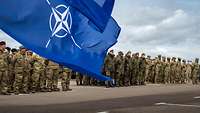
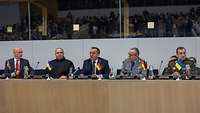
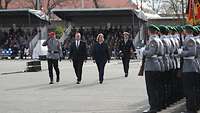


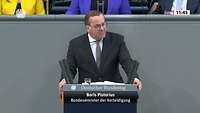
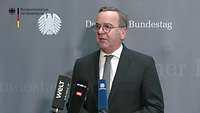

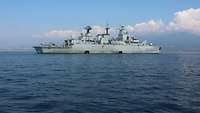
Inhalte teilen via